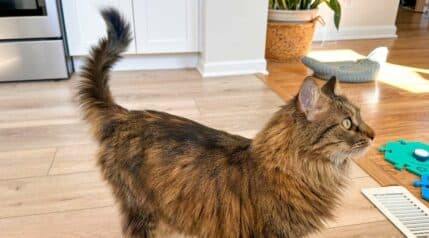When you purchase through links on our site, we may earn a commission. Here’s how it works.
Have you ever fed your cat a nice meal and then watched her throw it up undigested a short time later? You are not alone if you are wondering why your cat is throwing up undigested food. It’s something that almost every cat owner has experienced at least once.
A few different things can cause a cat to throw up undigested food. Sometimes, it can be due to a hairball, eating too fast, allergies, or a change in diet. Other times, there can be a more serious cause.
I’ve certainly experienced my cats throwing up undigested food, so I understand the worry and stress it causes. If you are looking for answers to why your fur baby is doing this and what to do about it, you have come to the right place. Let’s get into the details and reasons why your cat might be throwing up undigested food.
Why Is My Cat Throwing Up Undigested Food?
A few different triggers can cause your cat to throw up or regurgitate undigested food. If your cat throws up occasionally, including hairballs, this is likely not anything to be very worried about. However, if the behavior becomes more frequent, you’ll want to take steps to determine the cause.
Cats throw up for various reasons, including eating too quickly, food allergies, hairballs, dietary indiscretion, gastrointestinal dysfunction, eating something bad, or an underlying medical issue like pancreatitis, diabetes, or other diseases.
Kitties often cough things up, something we humans refer to as vomiting. However, in felines, it is essential to understand the difference between vomiting and regurgitation.
Regurgitation vs Vomiting

Cats vomit fairly regularly for different reasons, and they also regurgitate, and owners need to know the difference. Most of the time, if you see a lot of intact food, and it happens closely after eating, your kitty is likely regurgitating, not vomiting. While it may not be the most pleasant subject, it is crucial to know the difference between these to ensure that your pet is okay.
Regurgitation
Regurgitation is not as intense as vomiting. True regurgitation happens when food is expelled from the mouth, throat (pharynx), and esophagus. Regurgitation always happens closely after eating and is a less dramatic event. Your cat may gag or cough, but regurgitation is not very loud. The contents will look undigested but may have a little mucus covering it. In some cases, regurgitation will come out in a cylindrical shape.
Vomiting
Vomiting is a much more violent experience because the contents of the stomach and upper small intestine are expelled from the body. Regurgitation is relatively passive, while vomiting is not. Your kitty may feel anxious, start pacing, licking their lips, and experience stomach contractions and body spasms before starting to gag, wretch, and vomit. Their stomach contents will look partially digested and usually will contain yellow or green bile from the small intestine.
Vomiting can happen directly after eating, as well as a few hours afterward. One clear way to tell the difference between regurgitating and vomiting is that regurgitated food looks undigested because it never reaches the stomach. Some water and saliva may accompany it. Regurgitation does not involve nausea or any type of abdominal contraction. Regurgitation is a far easier process than vomiting.
7 Top Reasons Why Cats Regurgitate Undigested Food

Below, I will explain some common reasons why cats regurgitate meals.
1. Overeating & Eating Too Fast
When cats overeat, it overflows the stomach, causing the excess contents to head up and out the way it comes in. Eating too quickly and gulping down water too fast causes your kitty to swallow excess air. The air then causes what is in the stomach and esophagus to be pushed out. Sometimes, if food is too cold, it can also cause a kitty to regurgitate shortly after eating.
If your kitty has a habit of eating too fast, try feeding her smaller meals spread throughout the day, using a slow feeder or puzzle mat feeder, or feeding her separately from other cats.
2. Drinking Too Much Water
Just like overfilling themselves with kibble, excess water intake can cause a cat to regurgitate food. If the stomach is already full of water, or they drink a lot right after eating, they may regurgitate. A slow-drip water bowl or drinking fountain may be a good idea to prevent this.
3. Stress
Stress can affect cats in many ways. If your kitty is stressed, fearful, or anxious and feels that she must compete for meals against other animals in the house, she may start to eat and drink very rapidly. Stress can lead to overeating and quickly regurgitating whatever they eat.
If your kitty is regurgitating due to stress eating, you have a couple of options. Try a raised bowl and a slow feeder to help her eat at a regular pace. Additionally, feeding each kitty in a different place may help if they are overeating due to competing for resources.
4. Esophagitis
Inflammation in the esophagus, or esophagitis, prevents the proper movement of the esophagus. When working correctly, this movement is a forward motion pushing food down into the stomach. However, the inflammation leads to spasms, which can cause regurgitation. In some cases, recurrent vomiting may bring up stomach acid, triggering inflammation in the esophagus.
5. Esophageal Obstruction
An esophageal obstruction refers to a foreign object stuck in a cat’s esophagus. It can lead to a blockage, preventing foods from reaching the stomach and triggering regurgitation. A blockage in the esophagus is a potentially life-threatening condition. It can cause injury and tear to the esophagus and lead to intestinal blockage if it further passes into the body.
If you suspect your pet has ingested a foreign body, it is best to contact your veterinarian before trying to remove it. Trying to remove an object from the throat can often push it further in and cause more harm than good.
6. Congenital Abnormality In The Esophagus
In rare cases, cats can be born with a congenital abnormality of the esophagus that may contribute to regurgitation issues. Congenital abnormalities include hernias, megaesophagus, cricopharyngeal achalasia, and vascular ring anomalies. Megaesophagus is one of the most common inherited motility disorders and is a condition in which the esophagus becomes abnormally dilated, preventing it from regular function. Stricture, a narrowing of the esophagus, can happen, preventing anything from progressing.
Your pet may need medication or surgical treatment if she has chronic regurgitation due to an esophageal abnormality. She may also need to be on a special diet to help meals pass through the esophagus and into the stomach more easily. You may need to work with your veterinarian to develop a specific diet if this is the case.
7. Disease
Sometimes, diseases can affect the esophagus and cause a kitty to regurgitate. These can include parasitic infections, benign growths, cancers, viruses like rabies, hiatal hernias, lymphoma, and feline rabies, among other diseases.
Occasional regurgitation is something that almost every feline may experience. However, if this becomes a frequent or chronic occurrence, and you are noticing other symptoms in your pet, like poor appetite, low energy, weight loss, attitude change, excessive licking or scratching at themselves, or other symptoms, it is important to reach out to your veterinarian. Your pet will need an exam, and likely some tests run to rule out any serious underlying medical cause.
My Personal Experience With Cats Regurgitating Undigested Food

I have been a feline owner for over 30 years and have definitely experienced cats vomiting on several occasions. My purr baby Zaphod, an 11-year-old male, sometimes regurgitates undigested food. While this doesn’t happen often, not even once a month, I have observed it on more than one occasion.
Zaphod often eats his meals side by side with his sister. After noticing the regurgitation, I started feeding them their meals separately. I noticed that it only happened after I fed them wet or canned meals. I realized that Zaphod was competing with his sister to eat more chow faster than her. Separating them has been a significant help, and I have seen a considerable reduction in this regurgitation.
5 Other Reasons Cats Vomit

Vomiting is a fairly common occurrence for cats and is often harmless. However, there are some instances in which it may be indicative of a more serious problem. Below are examples of times when cats vomit rather than regurgitate.
- Hairballs
- Dietary Changes
- Food Allergy & Intolerance
- Gastritis
- Parasitic Infection
In some of these instances, your cat may require vet care. This is when pet insurance can come in handy because it can help cover unexpected costs, such as your cat vomiting for no apparent reason. We’ve reviewed and compared the best pet insurance for you to learn more.
Frequently Asked Questions
Cats regurgitating and throwing up is a common occurrence, and of course, owners have lots of questions. Below, I cover a few of the most frequently asked questions. If I didn’t get to yours, please let me know in the comments.
How do I prevent my cat from regurgitating undigested food?
Raised feeding and water bowls, slow feeders, smaller meals, and feeding your kitty separately from other animals are all steps to take to prevent regurgitation.
Why is my cat throwing up undigested food but acting normal?
If your purr baby has regurgitated but is acting normally otherwise, she may have overeaten or gulped down their meals and water too quickly. To be on the safe side, you should observe your cat to ensure there are no other symptoms or repeated vomiting. However, if your kitty is behaving normally, especially after a single occurrence of regurgitation, is likely not a big cause for concern.
Should I worry if my cat is throwing up yellow, undigested food?
You may be seeing bile if your kitty throws up a partially digested meal with a yellow liquid. There are a few different reasons your cat may vomit during the digestion process. The good news is that yellow bile is not something to be overly worried about if your pet behaves normally. A kitty vomiting yellow liquid or foam occasionally may indicate an empty stomach or ingesting something that disagrees with them. However, if it is a persistent problem, you will want to get your pet checked out, as vomiting of bile can be a sign of liver disease.
Healthy Feline Nutrition
As a feline owner, I am constantly researching and looking at different foods available on the market. Providing my pets with top-quality nutrition is one of the most critical parts of their care. I know that if I am providing them with a nutritionally balanced diet, it will contribute to their overall long-term health.
Budget always plays a significant role in the nutrition we choose to feed our pets. However, even cat owners with a smaller budget can find healthy options that supply top nutrition and flavor. Some brands, like Stella & Chewy’s, offer traditional foods, as well as those with freeze-dried meats. Other companies, like Smalls, are a little more expensive but offer human-grade, fresh meals. One of my top picks, Rachael Ray Nutrish, is very affordable and works well for my cat with kidney issues.
Why Trust Love Your Cat?
Danielle is a cat owner with over 30 years of experience. She’s also a dedicated and skilled researcher who works hard to stay on top of the latest research, developments, and trends in pet care and products. She has tested and reviewed nearly 100 kinds of cat food and counting. Danielle works alongside a talented and dedicated team to provide pet owners with helpful information to better their lives.





